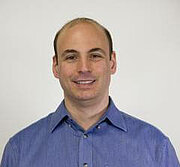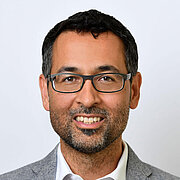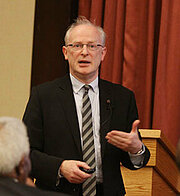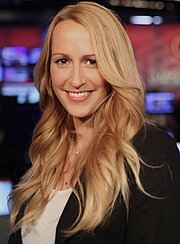Panel discussion with David Karol, Mark Kayser, and Desmond King.
The 2016 US presidential election produced a surprising result that deviated from established patterns and norms of US politics. On 20 January, Donald J. Trump was sworn in as the president of the United States. The Hertie School has invited two prominent scholars of US politics to join Hertie School professor Mark Kayser on a panel and share their thoughts on the social, economic and political causes of this outcome as well as on possible consequences of the Trump presidency for US policy and politics worldwide.
Discussants

David Karol studies parties, interest groups, political institutions and American political development. Before coming to the University of Maryland, he taught at American University, UC Berkeley and the UC Washington Center and was a Visiting Scholar at the Center for the Study of Democratic Politics at Princeton University. He won the "Emerging Scholar" Award for 2010 from the Political Organizations and Parties Section of the American Political Science Association. David Karol's current research concerns the role of elite opinion in American politics, showing how it produces durable policy disagreements between congresses and presidents regardless of which party controls these institutions. David Karol serves on the editorial board of the Journal of Politics and the Council of APSA's section on Political Organizations and Parties and is an occasional contributor to The Monkey Cage, the Washington Post's political science blog

Mark Kayser is Professor of Applied Methods and Comparative Politics at the Hertie School. His research primarily focuses on elections and political economy. Kayser’s major projects centre on partisan asymmetries in electoral accountability, media reporting on the economy, and the effect of electoral competitiveness on incumbent behaviour.

Desmond King is Andrew W Mellon Professor of American Government at Nuffield College, University of Oxford. He specialises in the study of the American state in US executive politics, race and politics in American political development, comparative welfare politics and labour market policy, democratisation and immigration policy. Before coming to Nuffield in 2002, he was a Fellow and Professor of Politics at St John’s College, Oxford of which he is now an Emeritus Fellow, and a lecturer in government at the London School of Economics. He held a Nuffield Foundation Social Science Research Fellowship in 1997-98, a British Academy Research Readership in 2000-2002, and a Leverhulme Trust Major Research Fellowship 2005-08. He was elected a Fellow of the British Academy (FBA) in 2003, a Member of the Royal Irish Academy (MRIA) in 2014, a Fellow of the Royal Historical Society (FRHistS) in 2015 and a Member of the Academia Europaea/Academy of Europe (MAE) in 2016.
Moderation

Charlotte Potts works as a political correspondent at DW’s parliamentary studio in Berlin. She is also one of the hosts of ZDF-Morgenmagazin. Before moving to Berlin, she spent seven years in Washington, DC, working as a producer for the two major German TV stations – ARD and ZDF and as a writer for outlets such as Handelsblatt. Potts has covered such social and political topics as the 2008 and 2012 presidential races, the Deepwater Horizon oil spill, the detainee camps in Guantanamo, the protests in Ferguson, and the Oscars in Los Angeles. She received her MA in history, psychology and economics from the University of Freiburg and a graduate certificate in foreign policy and journalism from the American University in Washington, DC.

